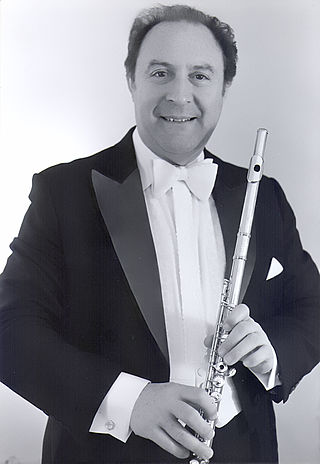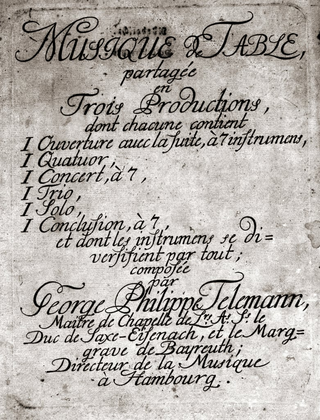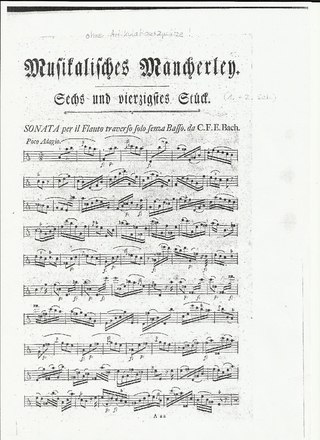Related Research Articles

Georg Philipp Telemann was a German Baroque composer and multi-instrumentalist. He is one of the most prolific composers in history, at least in terms of surviving oeuvre. Telemann was considered by his contemporaries to be one of the leading German composers of the time, and he was compared favourably both to his friend Johann Sebastian Bach, who made Telemann the godfather and namesake of his son Carl Philipp Emanuel, and to George Frideric Handel, whom Telemann also knew personally.

Carl Philipp Emanuel Bach, also formerly spelled Karl Philipp Emmanuel Bach, and commonly abbreviated C. P. E. Bach, was a German Baroque and Classical period composer and musician, the fifth child and second surviving son of Johann Sebastian Bach and Maria Barbara Bach.

Johann Joachim Quantz was a German composer, flutist and flute maker of the late Baroque period. Much of his professional career was spent in the court of Frederick the Great. Quantz composed hundreds of flute sonatas and concertos, and wrote On Playing the Flute, an influential treatise on flute performance. His works were known and appreciated by Bach, Haydn and Mozart.

Jean-Pierre Louis Rampal was a French flautist. Rampal popularised the flute in the post–World War II years, recovering flute compositions from the Baroque era, and spurring contemporary composers, such as Francis Poulenc, to create new works that have become modern standards in the flautist's repertoire.

Trevor David Pinnock is a British harpsichordist and conductor.
This is a list of notable events in music that took place in the year 1734.
The Western concert flute is a family of transverse (side-blown) woodwind instruments made of metal or wood. It is the most common variant of the flute. A musician who plays the flute is called a “flautist” in British English, and a “flutist” in American English.

Hille Perl is a German virtuoso performer of the viola da gamba and lirone.
Lisa Beznosiuk is an English flautist of Ukrainian and Irish descent, specializing in period performance of baroque and classical music on historical flutes.
Rachel Podger is a British violinist and conductor specialising in the performance of Baroque music.

The Sonata in E major for flute and basso continuo is a sonata for transverse flute and figured bass composed by J. S. Bach in the 1740s. It was written as the result of a visit in 1741 to the court of Frederick the Great in Potsdam, where Bach's son Carl Philipp Emanuel had been appointed principal harpsichordist to the king the previous year. It was dedicated to Michael Gabriel Fredersdorf, the king's valet and private secretary, who, like the king, was an amateur flautist.

The Paris quartets is a collective designation for two sets of Chamber music compositions, each consisting of six works for flute, violin, viola da gamba, and continuo, by Georg Philipp Telemann, first published in 1730 and 1738, respectively. Telemann called his two collections Quadri and Nouveaux Quatuors. The collective designation "Paris quartets" was only first bestowed upon them in the second half of the twentieth century by the editors of the Telemann Musikalische Werke, because of their association with Telemann's celebrity visit to Paris in 1737–38. They bear the numbers 43:D1, 43:D3, 43:e1, 43:e4, 43:G1, 43:G4, 43:g1, 43:A1, 43:A3, 43:a2, 43:h1, 43:h2 in the TWV.
Alexis Kossenko is a French contemporary flautist, conductor and musicologist.
Daniel Robert Waitzman is an American flutist and composer.

Tafelmusik is a collection of instrumental compositions by Georg Philipp Telemann (1681–1767), published in 1733. The original title is Musique de table. The work is one of Telemann's most widely known compositions; it is the climax and at the same time one of the last examples of courtly table music.

The Sonata for Solo Flute in A minor, Wq.132, H 562, is a sonata for flute, without Basso Continuo or accompanying instruments, composed by Carl Philipp Emanuel Bach. The sonata is considered, along with Telemann's Fantasias for Solo Flute and J. S. Bach's A minor partita, one of the most significant works for unaccompanied flute before the 20th century. It is the sole flute work by Bach that was printed and published during his lifetime. No manuscript of it has been discovered.
Emi Ferguson is an English-American flutist, performer, singer, composer, and professor at the Juilliard School.

Claire Guimond is a Canadian flute player who was the founding member and former Artistic Director of Arion Baroque Orchestra.

Arion Baroque Orchestra, founded in 1981, is a Canadian baroque orchestra based in Montreal, Quebec, specializing in music of the 18th century performed on period instruments.
Kate Clark is a solo, chamber, and orchestral flutist based in Amsterdam, The Netherlands. She is a specialist in the performance and performance practice of historical flutes from the renaissance to the early modern period, and teacher of historical flutes at the Royal Conservatory of The Hague.
References
- 1 2 3 "Rachel Brown | Royal College of Music". www.rcm.ac.uk. Retrieved 24 March 2018.
- 1 2 "Rachel Brown: 1984 Young Artist Competition, first place". Flutist Quarterly . 37 (3): 30. Spring 2012.
- ↑ August, Dolores (Summer 2010). "On January 25, the Texas Flute Society, in conjunction with the University of North Texas College of Music, hosted a three-day event featuring Rachel Brown". Flutist Quarterly . Academic OneFile: 41. Retrieved 15 July 2024.
- 1 2 3 4 Jicha, Victoria (September 2011). "Rachel Brown". Flute Talk. 31: 10–13, 29.
- 1 2 3 4 5 6 Hulbert, Dan (December 2010). "Rachel Brown: Lively Scholarship, Informed Virtuosity" (PDF). The New York Flute Club Newsletter: 1, 4–5.
- ↑ Stern, Wendy (December 2012). "What Color is Your Parachute?" (PDF). The New York Flute Club Newsletter: 2.
- ↑ "About". London Handel Players. Retrieved 15 July 2024.
- 1 2 "Flutist Rachel Brown has released two recent CDs: Private Passion". Flutist Quarterly , 2010, p. 70. Academic OneFile. Accessed 24 March 2018.
- ↑ Loewy, Andrea. "A Tribute to Bach". Flutist Quarterly , 2016, p. 67. Academic OneFile. Accessed 24 March 2018.
- ↑ Brown, Rachel (2006). The Early Flute: A Practical Guide. Cambridge: Cambridge University Press. ISBN 0521813913. OCLC 1066950638.